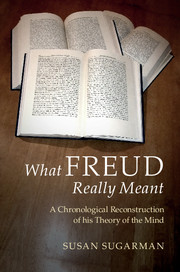Book contents
- Frontmatter
- Dedication
- Contents
- Acknowledgments
- Introduction
- 1 Freud on psychoanalysis: Five Lectures on Psychoanalysis (1909a)
- 2 The pleasure and reality principles: “Formulations regarding two principles in mental functioning” (1911); “The psychology of the dream-processes” from The Interpretation of Dreams” (1900)
- 3 Ambivalence and the origin of the civilized mind: “Taboo and emotional ambivalence” from Totem and Taboo (1913b)
- 4 Narcissism as a stage in development: “On narcissism: an introduction” (1914)
- 5 The impetus to the mind: “Instincts and their vicissitudes” (1915a)
- 6 The possibility of repression: “Repression” (1915b); “Negation” (1925a)
- 7 The unconscious and the structure of the mind: “The unconscious” (1915c)
- 8 Beyond the pleasure principle: Beyond the Pleasure Principle (1920)
- 9 A new architecture of the mind: The Ego and the Id (1923)
- 10 Pleasure revised: “An economic problem in masochism” (1924)
- 11 Civilization, morality, and the pursuit of pleasure: Civilization and its Discontents (1930)
- Epilogue: What Freud really meant
- References
- Index
Epilogue: What Freud really meant
Published online by Cambridge University Press: 05 April 2016
- Frontmatter
- Dedication
- Contents
- Acknowledgments
- Introduction
- 1 Freud on psychoanalysis: Five Lectures on Psychoanalysis (1909a)
- 2 The pleasure and reality principles: “Formulations regarding two principles in mental functioning” (1911); “The psychology of the dream-processes” from The Interpretation of Dreams” (1900)
- 3 Ambivalence and the origin of the civilized mind: “Taboo and emotional ambivalence” from Totem and Taboo (1913b)
- 4 Narcissism as a stage in development: “On narcissism: an introduction” (1914)
- 5 The impetus to the mind: “Instincts and their vicissitudes” (1915a)
- 6 The possibility of repression: “Repression” (1915b); “Negation” (1925a)
- 7 The unconscious and the structure of the mind: “The unconscious” (1915c)
- 8 Beyond the pleasure principle: Beyond the Pleasure Principle (1920)
- 9 A new architecture of the mind: The Ego and the Id (1923)
- 10 Pleasure revised: “An economic problem in masochism” (1924)
- 11 Civilization, morality, and the pursuit of pleasure: Civilization and its Discontents (1930)
- Epilogue: What Freud really meant
- References
- Index
Summary
Erik Erikson, the esteemed cultural psychologist and psychoanalyst, once bristled at what he called Freud's “originology” (1958, p. 18). He was referring to a way of thought that attempts to understand every human condition by tracing it to an earlier and simpler state, ultimately the earliest and simplest state, to which the condition might relate. Erikson himself believed, to the contrary, that later-emerging forms of experience add something new to existing structure, and that the two interact dialectically. For him, present and past, like culture and the individual or the social and biological, create one another; for example, through subtle variations in child-rearing, cultures help to shape the kinds of individuals who can function effectively within them, as he famously documented in his Childhood and Society (1950).
Erikson is one among many psychoanalytic theorists after Freud who have understood him to have reduced mental life in this way to one or another of its elements. They insist, for example, humans are not the mere hedonists they understand Freud's pleasure principle to imply they are (e.g., Fairbairn, 1994, Vol. 1, p. 131). Or they say the full panoply of adult passions and pursuits cannot be reduced to sexual or aggressive drives or to the conflicts they precipitate (e.g., Hartmann, 1939; Kohut, 1977). Some maintain that Freud's compartmentalization of the way the mind operates engenders loss of agency, when we need desperately to reverse such loss should we fall ill (e.g., Schafer, 1976). Others fault Freud for underestimating the positive potential inherent in the early mental stages he emphasizes, like narcissism (e.g., Kohut, 1977).
Freud does seek to trace human mental life to its primordial constituents. He indeed declares the avoidance of pain and cultivation of pleasure – the pleasure principle – to be the initial and most fundamental rule of our mental life (Freud, 1911; Chapter 2 here). He traces the principle to the most primitive possible behavior, the reflex; he traces the reflex, in turn, to the original function of the nervous system, which is to discharge the excitation that reaches it (Freud, 1900; Chapter 2 here). He identifies sex and, as of his earlier writings, survival, as the most basic instincts from which all impulses derive (1915a; Chapter 5 here).
- Type
- Chapter
- Information
- What Freud Really MeantA Chronological Reconstruction of his Theory of the Mind, pp. 150 - 177Publisher: Cambridge University PressPrint publication year: 2016



